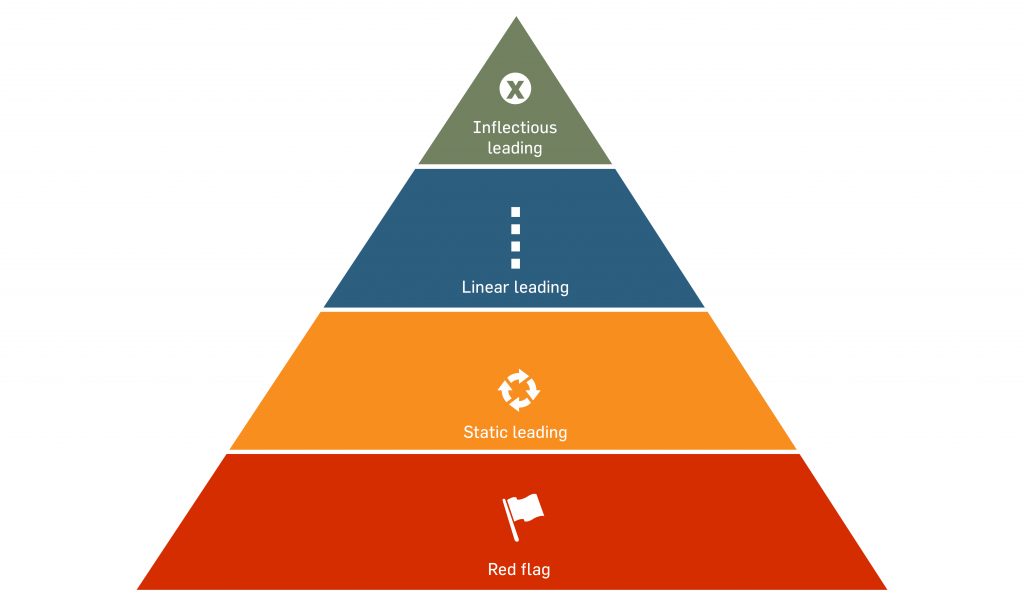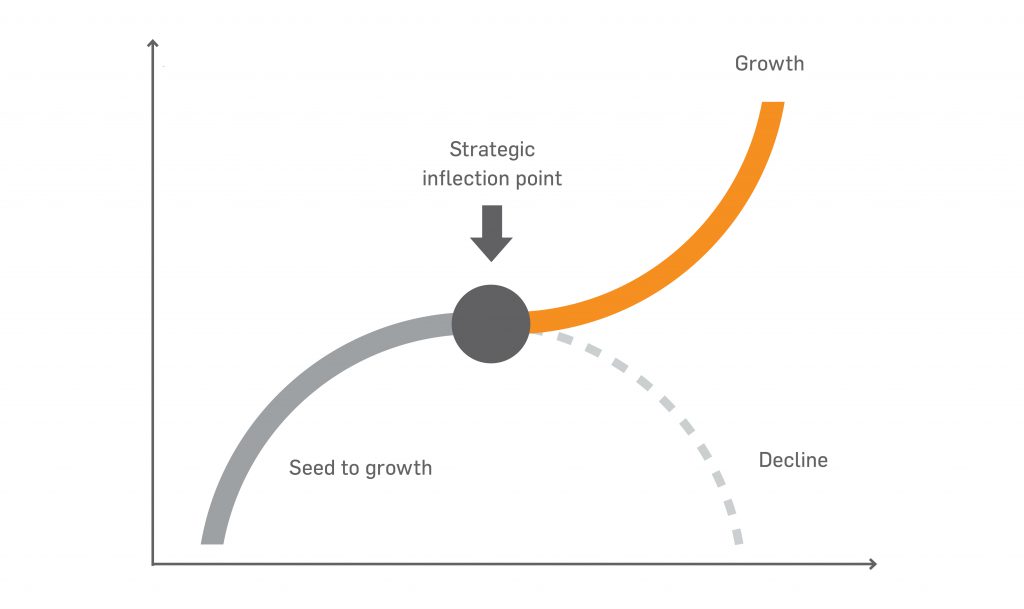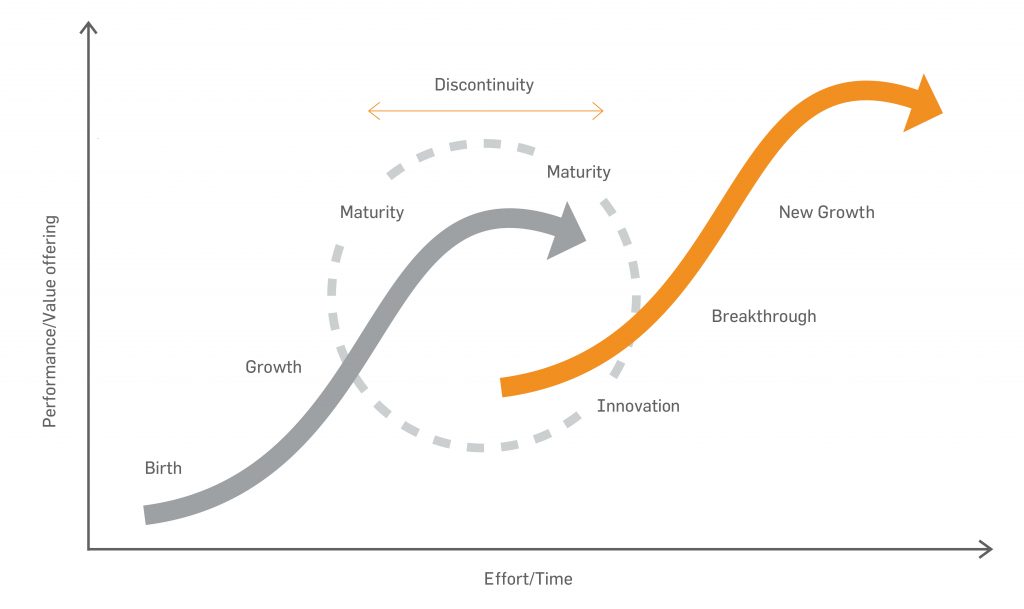Are you ‘inflectious’? An ‘inflection point’ is a turning point – a decisive moment or event that marks the start of a significant change in a situation. Andy Grove of Intel coined the term ‘strategic inflection point’ to describe the point after which continuing the status quo would lead to certain failure.
On a graph showing revenue growth versus reducing costs, a strategic inflection point would interrupt a line with a downward trajectory curve, causing it to begin to curve upwards.
Our leadership model looks at four types of leading, which can happen at all levels. At the peak is Inflectious Leading.


So are you inflectious? We have studied inflectious people and cultures for 20 years. Inflectious people and organisations outperform the market (or their peers). Below are the ‘7 Habits of Highly Inflectious People’ (as a tribute to Stephen Covey, undisputed champ of effectiveness). And, for those that like that kind of thing, there is a WDTMFM [What Does That Mean For Me]
- Highly inflectious people are time and effort effectiveness junkies. Seems obvious, but it’s an absolute baseline and a constant inflection opportunity. Highly inflectious people put a great deal of focus on bang for buck time/effort reward. They havean instinct for ROE, [Return On Effort]. They pursue simplicity, reduce complexity and are happy to make tough decisions early – on both micro and macro levels. ROE is a habit that is hard to turn off. ROE is why highly inflectious people do not have to work later, be more stressed, or get overcommitted. They are good at saying “no”, “no, thank you”, “thanks but no thanks”. WDTMFM:Get really capable. Build up a wide variety of skillsets, at a fairly deep level. Don’t buy the specialist/generalist split. Become a specialist at multiple skillsets. Especially recurring tasks like meeting management, people management, strategy, finance, purchasing, negotiation, influencing and selling skills conflict, project management, leading, delegating.
- Highly inflectious people set bigger goals. They know that the gamble to commit to more may well pay off, and that, in doing so, they will very likely achieve their baseline goals anyway. So, even when they seem to be failing, inflectious people still outperform their peers. They are likely to make goals public as part of their motivational strategy. Meanwhile, their linear leading peers are afraid to commit to big goals in case they fail, and are prepared to invest energy fighting for lower targets or less ambitious changes. WDTMFM:Approach your boss, and tell them explicitly you would like to raise your target/goal by between 20 and 100%. This behaviour is so countercultural it lays down a massive marker. Now go out and do it. You will be credited with special powers from within and without because of your “signifier” behaviour. If your bosses react badly, pay attention to habits four and five.
- Highly inflectious people are avid network synergisers. There is a reason top Silicon Valley executives likeYammer founder David Sacks, SurveyMonkey’s Dave Goldberg and Inside.com’s Jason Calacanis open their homes to play private, high-stakes poker games with extraordinary Las Vegas pros like Phil Hellmuth. They can relax, chatting about their financial investments and business strategies with the kings and queens of advanced maths and probability; fellow investment professionals. And the poker guys learn how to invest their hard-won millions in Silicon Valley’s next biggest hit. All while taking time out and making like-minded friends. Highly inflectious people like working with friends, family and close, long-term business partners. WDTMFM: Start your own network. Maybe a monthly lunch, brunch, poker night. Even a pilates stretch off. Invite like-minded inflectious people. See what happens.
- Highly inflectious people seek out frictionless processes. Zuckerberg’s wardrobe. Expert exec support, streamlined travel packing. Regular restaurant haunts. Working with known partners. Routines. Rarely are highly inflectious people weirdly creative. It’s more likely they have a relentless determination on achieving. Jobs. Musk. Zuck. Look how Bill Gates has “retired”. WDTMFM: Streamline your life: commute, exercise, family life. Cull a few friends. Quality over quantity. Eat less. Sleep more.
- Highly inflectious know when it’s time to change. That inflection curve. It alwayshas a point of negative inflection. Highly infectious people know that the strategy that got them where they are will not help them succeed at the next level. Linear people believe the reverse. That they have accumulated enough wisdom to ‘do things their way’. As inflectious people’s responsibilities grow, they adapt their strategies such as hiring, goal setting, financial risks. Major founders normally de-risk themselves by selling stock, taking on boards, hiring CEOs above them, etc. WDTMFM: Growth and learning. Being prepared to take on new styles of leadership, management, communication, planning.

- Highly inflectious people are prepare to ‘bet the shop’. Whilst they understand how risk works, in certain moments they will take huge calculated risks, seemingly jeopardizing their reputation, wealth, security. (NB They are not really motivated by reputation, wealth, security). The motivation within is challenge and adventure. WDTMFM: Very likely a job role change. Maybe a house move. Maybe hire some new people.
- Nothing to add. Highly inflectious people get it done, easily, and early. So if they budget for seven points, they will get it done in six. WDTMFM: I’m off for a bike ride.
